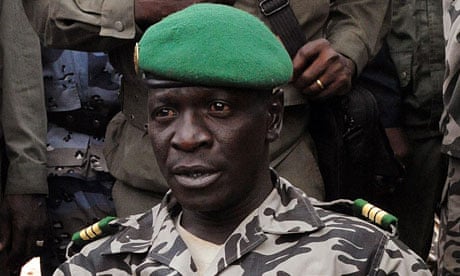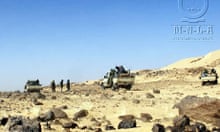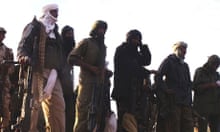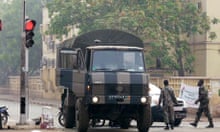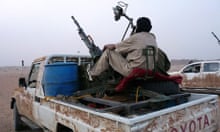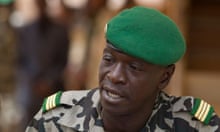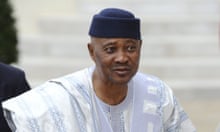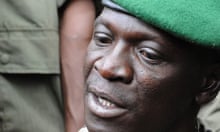The African Union has suspended Mali following Thursday's military coup, which deposed long-time president Amadou Toumani Touré.
The AU chairman, Jean Ping, told a meeting of the AU Peace and Security Council in Addis Ababa on Friday, that a high-level mission would be sent to Mali's capital Bamako to assess the situation.
"We have been told that the president is safe, protected by a certain number of loyalists," Ping told reporters. There had been fears for Touré, whose whereabouts had been unknown since the coup.
"The president is in Mali for sure. The assurances we are getting from those that are protecting him is that he is not far from Bamako," Ping said.
The coup has already been widely condemned – the west African regional governance body, Ecowas, described it as military adventurism, and the EU, the African Development Bank and the World Bank have all suspended aid programmes to the country.
The coup took place just weeks before an election was due to be held in Mali, for which Touré had announced he would not be standing.
The situation in Bamako is being described as tense but calm, although groups of soldiers have been seen driving around and shooting in the air.
Witnesses say widespread looting has been taking place, with soldiers flagging down cars and then stealing them.
"Any young man in a uniform has taken the opportunity to drive around, causing chaos and letting fire," said one western journalist in Bamako.
The military was ordered back to barracks on Friday morning by the leaders of the coup, a group of relatively junior and hitherto unknown soldiers known as the National Committee for the Reinstatement of Democracy and the Restoration of the State (CNRDRE).
"Things are calming down," said Abdoul Karim Ba, a Malian journalist in the city. "But people still don't really know what is going on." Ba said that the CNRDRE had called a meeting of civil service and administration officials in the town of Kati, north of Bamako, but that nothing seems to have been resolved.
A stalemate seems to have been established between the CNRDRE, which is in control of most of the state institutions and the area around Kouliba, the presidential palace, and the "Red Berets" elite presidential guard and parachute regiment, who are believed to still be protecting Touré. He is rumoured to be being held at a military barracks near the US embassy.
"People don't really seem to be very scared," said a resident of Bamako, who asked to remain anonymous. "A lot of people support the coup because they were sick of young soldiers being sent up north to be used as cannon fodder."
The leader of the coup, Captain Amadou Sanogo, a former English teacher at the military base in Kati, said it had been staged in retaliation for Touré's poor handling of a Tuareg rebellion in the north of the country. He added that he had no intention of hanging onto power and that he merely wanted the army to be properly equipped to secure the country. Scores of Malian soldiers have been killed since January as they faced better-armed and well-organised Tuareg rebels.
State television was briefly taken off air on Thursday and when restored was reportedly playing repeats of films, including Charlie and the Chocolate Factory. News bulletins have since recommenced, with the most recent telling Malians the situation is under control. Internet and phone services appear to be working properly, but banks and shops remain shut. Petrol prices have doubled almost overnight in the capital.
A decision to close all land borders and Bamako airport has stranded a delegation of Kenyan MPs, including the foreign minister, Moses Wetangula.
The Tuareg rebels launched raids on a number of fronts in January, apparently helped by weaponry some had brought back from Libya, where they had been fighting on the side of Muammar Gaddafi. They are seeking independence for the Tuareg homelands, a vast desert region more than 600 miles from Bamako.
Mali's poorly equipped army of just 7,000 men has been no match for the rebels, who hold several key towns in the north, including Tessalit, Aguel Hoc and Menaka. The rebels announced on Thursday that they had also captured Anefis, near Gao.
About 130,000 people are believed to have been displaced by the conflict, many of them crossing into neighbouring Niger, Burkina Faso and Mauritania.
